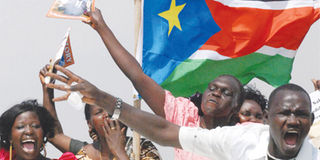South Sudan: The world’s newest nation

Today, the 21-year liberation war comes to an official end as people celebrate South Sudan’s independence day in Juba. AFP PHOTO/PETER MARTELL.
Juba, South Sudan
The Dr John Garang Mausoleum, the venue where the flag of the Republic of Sudan will be lowered at 10am today and that of the Republic of South Sudan hoisted, has been painted in bright colours and spruced up in readiness for the hour.
The Juba International Airport has been closed to commercial flights for two days starting Friday to enable world leaders and other foreign guests travel for the independence celebrations of South Sudan unhinged.
Most of the streets in Juba have been washed clean, fast-growing flowers planted, trees along the roadside painted white, and security officials have combed all homes looking for any fire arms and weapons, including pangas and axes.
As South Sudan welcomes the world to Juba to celebrate its independence from the north today, Africa’s newest nation is pulling all stops to put its best foot forward. Sometimes, they have wobbled, like with the late construction of venue for the independence celebrations and decoration of the capital. But even then, they have wobbled with confidence; the confidence of a people that feel they have finally reached the Promised Land.
On several streets of Juba, a number of groups were yesterday matching, singing and dancing in celebration. One group that caught the eye was that of Sudan People’s Liberation Army (SPLA) veterans who lost some or all their limbs during the 21-year war that preceded the signing of the Comprehensive Peace Agreement between the north and south of Sudan.
Mr John Kurgai, 42, who led the group, lost both of his arms during the war. But as he proudly matched towards the Dr Garang Mausoleum, Mr Kurgai told Saturday Monitor that he could live with the loss of his arms if the result was freedom for his people. “This day is what we were fighting for. That is why I am happy. We lost our hands because of this day. Even those who died, it was for this day,” he said.
The group led by Mr Kurgai represented the more than 5,750 SPLA who lost their limbs during the war and are now being taken care of by the government under the South Sudan War Disabled Resettlement Commission.
The Commission’s Programme Officer, Mr Jack Jacob Ilija, said the government fully caters for the veterans. If those are some of the dividends independence brings, then the people of South Sudan have every reason to be excited and optimistic.
For today at least, the people of South Sudan will share that optimism with at least 30 world leaders, according to a statement released by the Government of South Sudan. The leaders will include the United Nations Secretary General, Mr Ban ki Moon, a high-powered US delegation led by its Ambassador to the UN, Ms Susan Rice, and several African leaders. Amid the euphoria, Mr Moon – who arrived in Juba at 4pm on Friday – sounded a word of caution in a Thursday newspaper article.
“On the day of its birth, South Sudan will rank near the bottom of all recognised human development indices,” wrote the UN Secretary General. For now, however, many of the people in South Sudan do not seem to be worried about the challenges that await after overcoming arguably their greatest challenge; breaking away from the north. Many people in South Sudan do not seem worried about the future because, well, the future is here.




